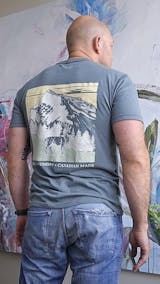Sober Babe Squad: The Boring Little Girls Club
My name is Kira Dunlop. I’m 24, originally from Toronto, Ontario but have lived (on and off) for the last eight years in Calgary. I am the Founder & President of the Boring Little Girls Club, the co-founder of K2 Speaker Series and the co-founder of Talk Alcohol YYC.

I got sober about two and a half years ago, after a particularly bad and dangerous night out. I woke up in the morning and looked at myself in the mirror and knew I was going to die if I continued drinking. It may not be that day or that week, but it was going to happen. So, I stopped drinking and I stopped using. I was saving myself.
It’s interesting to me, that no one really thought I had a problem. I can’t count the number of times people who said ‘oh, you’re not that bad’ or ‘you’re not an alcoholic, we would know!’. But that was the trick of my drinking – I was functioning. I held down a job and my own apartment and showed up for family dinner on time. But I was drinking (and using to a lesser extent – cocaine primarily) every day, by myself, whenever I could. I needed it.

When I got sober, the fact that people didn’t feel that I had a problem made them extremely uncomfortable. I was no worse or better than any of my friends – so what did that mean for them? My sobriety was holding up a mirror to all those closest to me and making them look at their own substance use habits. And guess what? People didn’t like that. I was told over and over again that it was ‘a phase,’ that I was ‘finding myself,’ even ‘don’t worry little girl, you’ll be able to handle yourself soon enough.’
Our society is alcohol centric – everything we do revolves around drinking. We are fed this narrative that to have a good life or to have fun, alcohol NEEDS to be involved. We are told to drink beer during sports games or have a glass of wine with the other moms and chuckle to ourselves about it being ‘mommy juice’ or after work, just to sit back and relax with our favourite drink. If you’re sober, you’re removing yourself from something that is ingrained in our society. And that, my friends, is extremely isolating.
This is why I founded the Boring Little Girls Club in November 2018, because I was searching for sober community, which was something I couldn’t find outside of the recovery sphere. I figured that if I was looking for something, and that something didn’t exist… well, dimes to dollars, others were looking for it as well.
The Boring Little Girls Club is a community of sober women, trans and non-binary folks who get together to have fun without alcohol and drugs. We exist because there is a need for sober affirming groups, for sober activities, for the sober community, outside of the recovery sphere. And to be very clear, we are not a recovery group, nor are we affiliated with any recovery group.
So, what do we exactly do? The BLGC hosts two different types of events: #membersonly – for women, trans and non-binary folks who are either sober, hopeful to become sober or would like to experience sober activities and #allwelcome – for anyon3 who would like to come out, the only requirement is that you are drug and alcohol-free when you attend the event. We host monthly coffee chats, have hosted different sober parties, have marched in the Calgary Pride Parade and Calgary Women’s March, and have been Sober Ambassadors for different events.
 Photo by Worn Leather Media
Photo by Worn Leather Media
Currently, we are facilitating our first ever Try Dry: Sober January Fundraiser for the DOAP Team, a mobile response to street level addiction and public intoxication. 40 amazing people across the country have signed up to go alcohol and drug-free (not including medication) to help us raise $10,000, 90% of which will go to the DOAP Team to provide support after budget cuts.
The Boring Little Girls Club’s main goal is to raise funds for the amazing work the DOAP Team is doing and through that, we will also be:
- Creating visibility and raising awareness surrounding living a sober life, substance use habits and mental health
- Instigating conversation and education surrounding sobriety, substance use and mental health
- Attempting to reduce stigma surrounding substance use, addiction and mental health
- Celebrating the people and organizations that are actively working in front line services to help and support our most vulnerable citizens
This is not to say that everyone who drinks is bad. We are not here to be negative or judgemental. We respect others for their choices, just as we wish to be respected for ours. What I can say is that I’ve gotten to this point, and you can too. I will shout my story from the rooftops if it means that someone reading it will realize that they are not alone. You are not alone. You have people to support and love and care for you. And you’ve got this.
If you’d like to support Try Dry: Sober January, you can donate here.









